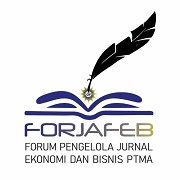Peran Dosen Fakultas Ekonomi dan Bisnis Universitas Teknologi Sumbawa dalam Peningkatan Literasi dan Inklusi Keuangan pada Masyarakat Kabupaten Sumbawa
Abstract
The purpose of this study was to identify the outcomes of higher education, in this case the University Technology of Sumbawa, because of its strategic location and positive response from the people of Sumbawa Regency, its ability to create added value and strategies for increasing public awareness of its financial future.
The object of this research is the community in Sumbawa Regency with a sample size of 250 respondents. This study measures the role of Lecturers on, Financial Literacy and Inclusion.
This study found that financial literacy partially affects the role of lecturers in being rejected. The financial inclusion variable has a significant effect on the role of the lecturer. Meanwhile, the variables of financial literacy and financial inclusion have a simultaneous effect on the role of lecturers.
The conclusion of this research is in determining the right strategy to improve Financial Literacy and Financial Inclusion by increasing the role of Lecturers through Tri Dharma in order to create a well-lierate financial societyKeywords
Full Text:
PDFReferences
Carpena, F., & Zia, B. (2011). Unpacking the Causal Chain of Financial Literacy. The World Bank Development Research Group. https://doi.org/10.1596/1813-9450-5798
Center for Financial Inclusion (CFI). (2016). CFI in 2016 the Year in Pictures. Retrieved from https://www.centerforfinancialinclusion.org/cfi-in-2016-the-year-in-pictures
Consultative Group to Assist the Poor (CGAP). (2003). Microfinance Consensus Guidelines: Definitions of selected financial terms ratios and adjustments for microfinance. CGAP Consensus Guidelines.
Herawati, N. T. (2017). Tingkat literasi keuangan mahasiswa serta faktor-faktor yang mempengaruhinya. Seminar Nasional Riset Inovatif 2017.
Hui, T. S., Nguyen, C., Palameta, B., Gyarmati, D., Wagner, R. A., Rose, N., & Llp, F. (2016). The role of financial literacy in financial decisions and retirement preparedness among seniors and near-seniors. In Social Research and Demonstration Corporation.
Huston, S. J. (2010). Measuring Financial Literacy. Journal of Consumer Affairs. https://doi.org/10.1111/j.1745-6606.2010.01170.x
Kurihara, K. K. (2013). Post Keynesian Economics. In Post Keynesian Economics. https://doi.org/10.4324/9781315016849
Otoritas Jasa Keungan (OJK). (2016). Surat Edaran Otoritas Jasa Keuangan Nomor 52 /SEOJK.03/2016. In Otoritas Jasa Keuangan. https://doi.org/10.1017/CBO9781107415324.004
Otoritas Jasa Keuangan (OJK). (2017). Statistik Perbankan Indonesia (Indonesia Banking Statistics) 2017. Statistik Perbankan Indonesia 2017. https://doi.org/VOL: 10 No. 8 JULI 2012
Otoritas Jasa Keuangan (OJK). (2019). Statistik Perbankan Indonesia - Agustus 2019. OJK.
Remund, D. L. (2010). Financial literacy explicated: The case for a clearer definition in an increasingly complex economy. Journal of Consumer Affairs. https://doi.org/10.1111/j.1745-6606.2010.01169.x
RI, U., & 14, N. Undang-Undang Tentang Guru dan Dosen. , Peraturan Pemerintah Republik Indonesia Nomor 36 Tahun 2005 § (2005).
Taft, M. K., Hosein, Z. Z., & Mehrizi, S. M. T. (2013). The Relation between Financial Literacy, Financial Wellbeing and Financial Concerns.
DOI: https://doi.org/10.32502/jimn.v10i1.2922
Refbacks
- There are currently no refbacks.

Jurnal Ilmu Manajemen is published by Pascasarjana Management Department. This work is licensed under a Creative Commons Attribution-ShareAlike 4.0 International License.
INDEXED / ABSTRACTED





.png)



1.png)













